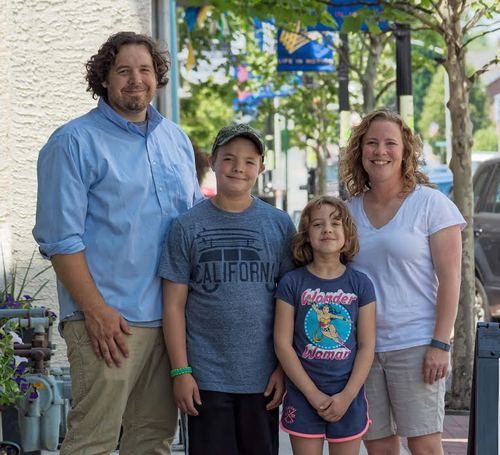The Renew Community, Lansdale PA

Doug Moister
serves as the lead pastor at the Renew Community. Doug and his wife Mear accepted the call to come on staff with Renew in 2011. Today, besides his pastoral and preaching duties with Renew, Doug is a life long learner, a church history nerd, a coach in the community, and an enthusiastic fly fisherman. Doug and Mear enjoy spending time with their kids and thanking God for all He has done and continues to do in the community.
How would you describe the area your church is in?
Lansdale is a northwest suburb of Philadelphia that sits along the R5 rail line(a rail line that runs into the heart of the city). It is a small town that has been growing its image and identity over the past 10 years. Some things folks notice when they come to town is the walkability, new construction, and renovations of old buildings. We have had an influx of coffee shops, breweries, and unique restaurants in the past few years. Which has shown a jump in the housing market and made things tougher for our lower income friends. Lansdale is culturally diverse, we have a thousand member mosque within walking distance from where we meet. Lastly, there are a ton of young families who live in Lansdale.
How would you describe the journey of pastoring The Renew Community? What have been some of the milestones/different seasons?
Around year 7 we experienced a really difficult season with some good folks leaving well and not so well. It also seemed that some of our most steady healthy folks were going through some really hard things. I believe looking back that Renew was invited into a season of growing up during that time and trusting the Lord to take us through that process. Another significant season for us happened a year and a half ago when J.R. Briggs the founding pastor stepped down but did not leave, that brought about the hiring of Ben Pitzen and he has been such a blessing to our community. We are also grateful that we get to tell a story of a founding pastor stepping down, handing over the reins and being part of the community. Lastly, our Elders ROCK! 3 years ago we added two women elders and that has built trust and been a blessing on so many levels to Renew. I could go on…
Looking back, what do you know now you wish you had known when you first started at Renew?
I don’t think there is much I would change, maybe the way I personally handled certain situations, or things we tried. I would have started seeing a spiritual director about 3 years sooner.
As you think about what you’ve been able to do so far in ministry there what are some things you have done/tried that have worked well?
I would say we have made it goal to be more creative in the arts and take risks in our gatherings and House churches. We have and it has paid off as we are seeing creatives come out of the woodwork for us.
What hasn’t worked so well? What have you had to rethink/reimagine/rework?
I am constantly evaluating what is working and not working. one thing I would say that has been something I am burdened about is continuing to push Renew outside of herself. We have been given the gift of a healthy community, and we need to use that to move beyond ourselves. Particularly in our house churches. House church is part of our hybrid structure and I am rethinking how we do mission in and to our geographical areas where our 9 house churches meet.
What is one failure you experienced and what did you learn from it?
Wow, just one…. A few months ago I was getting up to teach on a Sunday and I sensed the Holy Spirit put something on my heart which would have been a complete change from what I had planned. I didn’t listen, the teaching went off well, but I missed an opportunity to obey.
What is something you’ve been hearing from or learning from God in this last season of leading?
That God is faithful, and I need to grow in my own trust of his leadership.
What do you dream/hope/pray The Renew Community looks like in five years?
My prayer is that we plant two churches, one to the west of us and one in Philadelphia.







